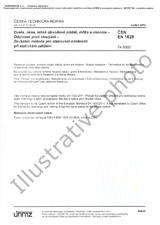We need your consent to use the individual data so that you can see information about your interests, among other things. Click "OK" to give your consent.
ČSN EN ISO 20418-3 (800220)
Textiles - Qualitative and quantitative proteomic analysis of some animal hair fibres - Part 3: Peptide detection using LC-MS without protein reduction
Translate name
STANDARD published on 1.1.2021
The information about the standard:
Designation standards: ČSN EN ISO 20418-3
Classification mark: 800220
Catalog number: 511076
Publication date standards: 1.1.2021
SKU: NS-1012684
The number of pages: 40
Approximate weight : 120 g (0.26 lbs)
Country: Czech technical standard
Category: Technical standards ČSN
The category - similar standards:
Annotation of standard text ČSN EN ISO 20418-3 (800220):
This document specifies a qualitative and quantitative procedure to determine the composition of animal hair fibre blends (made of wool, cashmere, yak, alpaca, camel or angora) by LC-MS without protein reduction.
NOTE 1 - The composition of non-animal hair fibres can be measured by ISO 1833 (all parts). Both results are combined to determine the total fibre composition.
The method is based on a preliminary identification, by light microscopy, of all fibres in the blend on the basis of their morphology, according to ISO/TR 11827[4]. It is not applicable if fibres of the same animal species (such as blends of cashmere and mohair) are present.
NOTE 2 - In this case, the quantitative analysis is performed using microscopical analysis [for example, ISO 17751 (all parts)]
Preview of the standard ČSN EN ISO 20418-3 (800220)
We recommend:
Technical standards updating
Do you want to make sure you use only the valid technical standards?
We can offer you a solution which will provide you a monthly overview concerning the updating of standards which you use.
Would you like to know more? Look at this page.




 Cookies
Cookies
